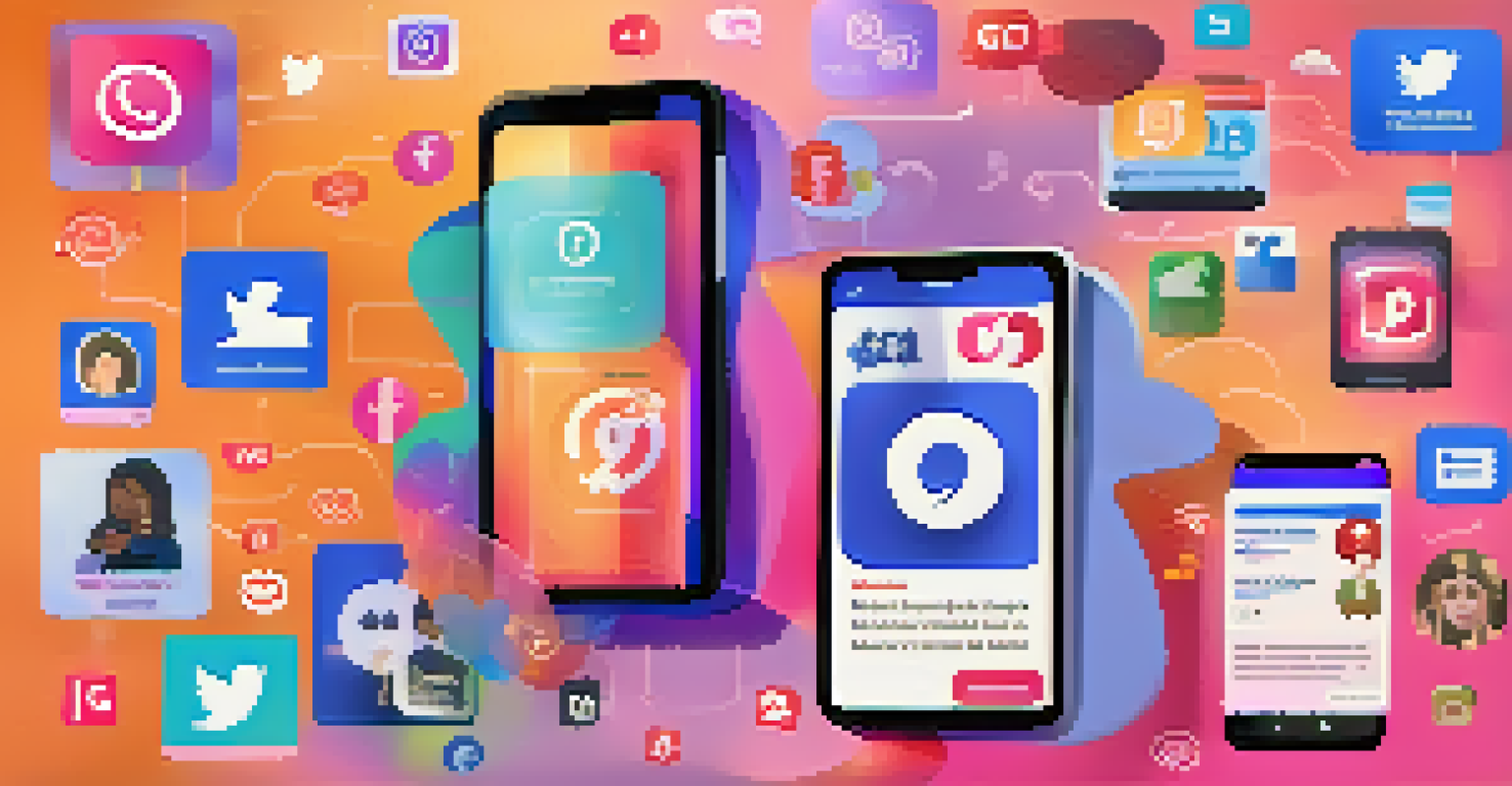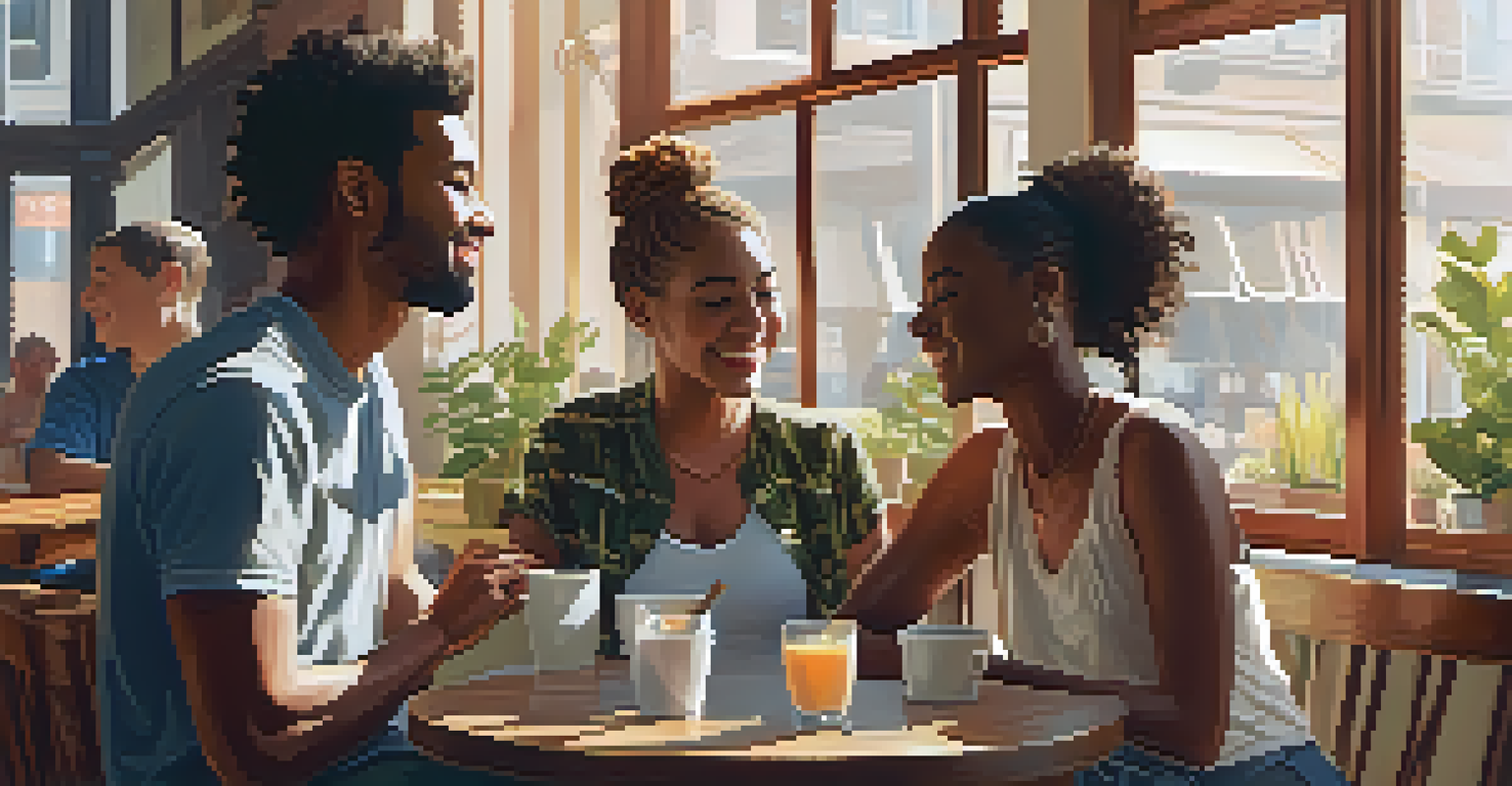The Influence of Social Media on Mental Health Awareness

Social Media as a Platform for Awareness and Education
Social media has transformed into a vital platform for sharing information about mental health. With just a few clicks, users can access a wealth of resources, articles, and personal stories that raise awareness. This democratization of information allows individuals to learn about mental health issues that may have been stigmatized in the past.
Social media is about the people! Not about your business. Provide for the people and the people will provide for you.
For instance, hashtags like #MentalHealthMatters and #EndTheStigma have created online communities where people can discuss their experiences openly. These conversations help to normalize mental health discussions, making it easier for individuals to seek help or share their own stories. In this way, social media acts as a catalyst for change, fostering understanding and empathy.
Moreover, many organizations utilize social media campaigns to educate the public, providing practical tips and support resources. Through engaging content like infographics and videos, they make complex topics more accessible, ensuring that mental health awareness reaches a broader audience.
The Positive Impact of Online Support Communities
Online support communities have flourished on social media, offering a safe space for individuals to connect. These groups allow members to share their struggles and triumphs, creating a sense of belonging and understanding. The emotional support found in these communities can significantly alleviate feelings of isolation often associated with mental health issues.

For example, platforms like Facebook and Reddit host groups dedicated to various mental health topics, where people can ask questions and share advice. Such interactions can validate experiences and provide comfort, reminding individuals that they are not alone in their journey. This shared understanding can be incredibly powerful in fostering resilience.
Social Media Boosts Mental Health Awareness
Platforms like Instagram and Twitter have become essential for sharing information and personal stories about mental health, fostering understanding and reducing stigma.
Additionally, these communities often encourage members to seek professional help when necessary. By normalizing the conversation around therapy and counseling, they help break down barriers that might prevent individuals from accessing the care they need.
The Influence of Influencers on Mental Health Conversations
In recent years, influencers have played a significant role in shaping mental health discussions on social media. Many influencers openly share their mental health journeys, helping to destigmatize these conversations. This visibility encourages their followers to discuss their own challenges, creating a ripple effect of awareness and openness.
We need to stop stigmatizing mental illness and start treating it like the health issue it is.
For instance, celebrities like Selena Gomez and Dwayne 'The Rock' Johnson have spoken candidly about their mental health struggles, reaching millions of fans. Their willingness to share personal stories can inspire others to seek help or find solace in knowing that they are not alone. This kind of representation is crucial in fostering a culture that values mental well-being.
However, it’s essential to approach these narratives with a critical eye. While influencers can provide valuable insights, their experiences may not represent everyone’s reality. It’s important for followers to seek diverse perspectives and professional guidance when navigating their mental health.
Risks of Social Media Use on Mental Health
While social media can promote mental health awareness, it also poses risks that can't be ignored. Constant exposure to curated, idealized lives on platforms like Instagram can lead to feelings of inadequacy and low self-esteem. This comparison culture can exacerbate mental health issues, particularly among younger users.
Moreover, cyberbullying and negative comments can have a detrimental impact on mental well-being. Victims of online harassment often experience increased anxiety and depression, highlighting the darker side of social interaction on these platforms. It’s a stark reminder that while social media can be a tool for connection, it can also breed negativity.
Online Communities Provide Support
Virtual support groups on social media create safe spaces for individuals to connect, share experiences, and find emotional support amidst mental health challenges.
To combat these risks, users must cultivate a healthy relationship with social media. This includes setting boundaries, curating feeds to include positive content, and taking breaks when needed. By being mindful of their usage, individuals can enjoy the benefits of social media while minimizing its potential harms.
The Role of Mental Health Professionals on Social Media
Mental health professionals have increasingly turned to social media to share knowledge and resources. By providing expert insights, they can help demystify mental health topics and offer guidance to those seeking help. This accessibility to professional advice can empower individuals to take charge of their mental health.
For instance, many therapists and psychologists use platforms like Twitter and Instagram to share tips, coping strategies, and informative content. These bite-sized nuggets of information can be incredibly helpful for individuals who might feel overwhelmed by traditional resources or therapy. Professionals also create discussions around mental health trends, helping to educate the public.
However, it’s crucial for individuals to discern between professional advice and personal opinions. Following licensed professionals and verified accounts can ensure that the information shared is credible and reliable. This way, social media becomes a valuable extension of traditional mental health resources.
The Impact of Social Media Campaigns on Awareness
Social media campaigns have emerged as powerful tools in raising mental health awareness. Events like Mental Health Awareness Month leverage hashtags and challenges to engage users and encourage conversations about mental well-being. These campaigns can significantly reduce stigma and foster a supportive environment.
For example, the #BellLetsTalk campaign in Canada has successfully sparked discussions around mental health, raising millions for mental health initiatives. Such campaigns not only educate the public but also motivate individuals to take action, whether that’s seeking help or supporting others. The collective effort amplifies messages that might otherwise go unheard.
Influencers Shape Mental Health Discourse
By openly discussing their own struggles, influencers help destigmatize mental health issues and encourage their followers to engage in these critical conversations.
Furthermore, these campaigns often involve partnerships with influencers and organizations, broadening their reach and impact. By uniting various voices, they create a chorus of support that resonates with diverse audiences, fostering a culture of understanding and compassion.
The Future of Social Media and Mental Health Awareness
As social media continues to evolve, so too will its role in mental health awareness. The rise of new platforms and technologies promises to reshape how we engage with mental health topics. Virtual reality, for example, could provide innovative ways for individuals to experience therapy or mindfulness exercises.
Moreover, as mental health becomes an increasingly important part of public discourse, social media companies are likely to implement features that promote well-being. Initiatives such as mood tracking apps or content moderation aimed at reducing negativity could significantly enhance user experience. This proactive approach can help create a healthier online environment.

Ultimately, the future holds immense potential for social media to become a more supportive space for mental health discussions. By harnessing technology and fostering community, we can continue to break down barriers and promote understanding in the years to come.